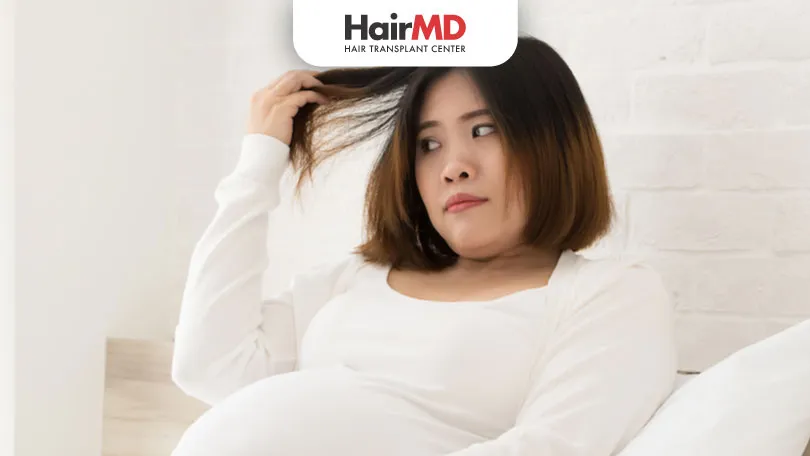10th Sept, 2023

Thicker, fuller hair can be attributed to one of the best effects of pregnancy. Most pregnant women would agree that they have the best hair of their lives during pregnancy. Unfortunately, just like pregnancy itself, the luscious hair is temporary too. Soon after welcoming your little one, you might notice some excessive shedding of that thick, full, healthy hair, and that’s totally normal.
Postpartum hair loss, or hair loss after pregnancy, is an upsetting condition that new moms usually deal with after pregnancy. Excessive hair loss is one of the biggest complaints amongst mothers post-delivery, but moms-to-be can take heart in the fact that pregnancy hair loss is a normal occurrence, and there are some effective ways to deal with it.
Here’s what new parents need to know about postpartum hair loss.
What’s covered in the article?
- What is Post Pregnancy Hair Loss? Is Hair Loss Post Pregnancy normal?
- Dealing with Postpartum Hair Loss
- Conclusion
What is Post Pregnancy Hair Loss? Is Hair Loss Post Pregnancy normal?
Hair issues after pregnancy are a temporary phenomenon and last only for the first few months after pregnancy, and with some extra care, your hair will bounce back to normal by the time your little one turns a year old. So, there is no need to panic or get disheartened. Just relax and enjoy your time with your bundle of joy!
Normally about 85% of our total hair is in a growing phase (anagen), while 15% is usually in the resting or falling phase (telogen). This is the reason why we normally see a few stray strands here and there. Now in pregnancy, almost 100% of hair goes into the growing phase due to the underlying hormones giving the pregnant lady healthy long hair; back to postpartum, as your hormones come back to normal levels, the hair cycle and anagen: telogen ratio returns to normal, causing all that extra hair to fall out eventually.
This is normal shedding and is noticed maximum after 3-4 months post delivery. You may see clumps of hair everywhere, on your hairbrush, on your pillow and clothes, in your shower drains etc. But there is no need to worry as this is not permanent and usually corrects itself in 6-8 months.
In some persons with added nutritional deficiencies or medical conditions like hypothyroidism, hair loss may continue for more than a year, and in such cases, it is best recommended to visit your dermatologist.
Dealing with Postpartum Hair Loss
Hair loss after pregnancy is a natural process caused due to hormonal changes that cannot be avoided. But supporting your hair with good hair care and nutrition can help your hair bounce back faster..
Here are a few suggestions that can go a long way in controlling hair fall after delivery.
- Continue eating healthy after pregnancy; good nutrition can prove to be an important step in keeping your hair healthy too
- Try including foods rich in proteins, iron and vitamins, like fresh fruits, green vegetables, nuts and seeds, lean meat etc in your diet as they can help in strengthening the hair.
- Be extra gentle with your hair while washing or combing. Use mild shampoos, soft brushes and wide-toothed combs to prevent the breaking of hair.
- Avoid using heat directly on your hair, as it may cause damage and breaking. It is advisable to skip blow dryers and hot irons.
- Avoid tight hairstyles that pull your hair and cause them to break. Instead, try donning a shorter hairstyle for increased volume.
- Try using volumising shampoos and lightweight conditioners that won’t weigh down your hair.
Lastly, there’s no magic secret or vitamin supplement that can prevent shedding.
The only treatment for post-pregnancy hair loss is patience! Visit HairMD, Pune, for more tips and suggestions.
Do You Know?
Nearly 250 Patients Visit HairMD
Everyday For Various Hair Concerns?
(Your journey to healthier and fuller hair starts here!)
Meet Our Dermatologists
Conclusion
In conclusion, post-pregnancy hair loss is a common and natural process that many new mothers experience. It is typically temporary, with hair growth usually returning to normal within a few months. Maintaining a balanced diet, managing stress, and gentle hair care can help support your hair’s recovery. If hair loss persists or becomes a concern, consulting with a hair specialist at HairMD Pune can provide you with personalized advice and treatment options to ensure your hair returns to its healthy state
Further Reading
Oily Scalp After Hair Transplant and How to Manage It
Oily scalp after hair transplant is common and manageable. Get simple care tips to reduce oiliness and support a smooth recovery.
Can You Get a Hair Transplant Without Shaving Your Head?
Hair transplant without shaving offers a discreet option for restoring hair. This method suits mild hair loss and allows you to maintain your natural look.
Manual Vs Robotic Hair Restoration
Discover the pros and cons of manual vs robotic hair restoration. Learn why manual hair transplants deliver natural results. Consult a hair specialist in Pune today.
Can Rainwater Cause Hair Loss? Understanding the Impact
Find out if Rainwater Cause Hair Loss & how to keep your hair safe during the monsoon season. Expert tips for keeping your hair healthy in rainy weather!
Have thoughts? Please let us know
We are committed not only to treating you, but also educating you.










